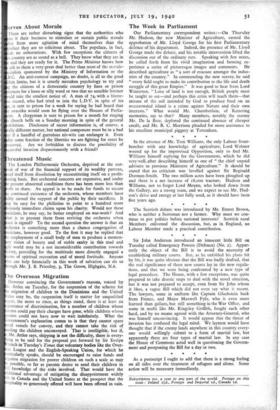Sir John Anderson introduced an innocent little Bill on Tuesday
called Emergency Powers (Defence) (No. 2). Appar- ently the object of the Bill is to avoid the necessity of establishing military courts. But, as he unfolded his plans bit by bit, it was quite obvious that the Bill was badly drafted, that the real significance of these new courts lay in the new regula- tions, and that we were being confronted by a new type of legal procedure. The House, with a few exceptions, was quite prepared to take drastic steps to deal with the novel situation, but it was not prepared to accept, even from Sir John whom it likes, a vague Bill which did not even say what it meant. The lawyers, some in uniform like Captain Gluckstein back from France, and Major Maxwell Fyfe, who is even more learned than gallant, but still something in the War Office, and some in mufti like Mr. Kingsley Griffith, fought each other hard, and by no means agreed with the Attorney-General, who was himself unconvincing. It would appear that the threat of invasion has confused the legal mind. We laymen would have thought that if the enemy lands anywhere in this country every- one would willingly submit to a form of martial law, but apparently there are four types of martial law. In any case the House of Commons acted well in questioning the Govern- ment and postponing the Bill for a day or two.
* *


































 Previous page
Previous page